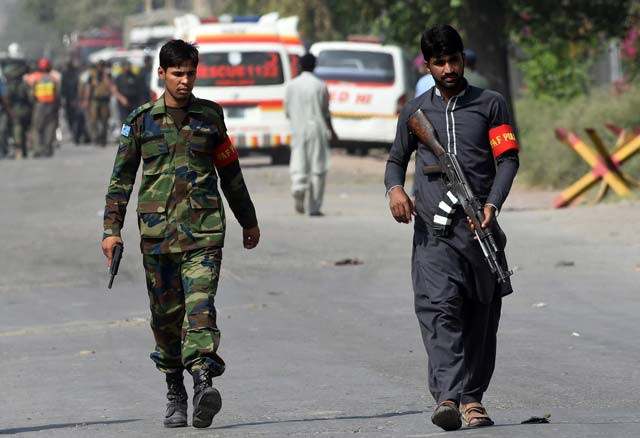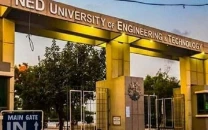A delicate balance
Pakistan cannot rely on Afghanistan to sanitise its border regions, and is going to have to step up its own efficacy

Security personnel arrive to take position outside the Pakistan Air Force base after an attack by militants in Peshawar on September 18, 2015. PHOTO: AFP

It has now emerged that five of the attackers were Pakistan nationals and their thumbprints matched those held by NADRA. The rest are being described as “foreign nationals”, but as yet no nationality is being ascribed to them. Leaving to one side the myriad questions arising from the attack, not the least of these relating to what appears to be an intelligence failure of epic proportions, to say nothing of the possibility of the attack being internally facilitated, both sides are faced with the ‘now what’ question.
This is unlikely to be the last such attack given the weaknesses in security apparatus on both sides of the border — though weaker on the Afghan than the Pakistan side. The ‘foreigners’ have not been identified for reasons of ‘sensitivity’ — which suggests that at least one of them may come from Afghanistan. This would be no surprise given the overlap between tribal territories that do not recognise — and never have recognised — international borders. Equally, given the radicalisation over decades that some tribes have experienced, it is no surprise that they provide willing volunteers for operations such as this. There has yet to be any concerted effort to reverse this narrative on either side of the border, and the Taliban anyway control much of the Afghan territory that abuts Pakistan, which makes it exceedingly difficult for the Afghan army or security agencies to effectively fight them. The Afghan government may want to rid itself of the Taliban, but that is easier said than done considering that the Taliban enjoy considerable popular support. Pakistan is in a similar fix, but somewhat better able to mount countervailing measures, though whether the state is truly committed at every level to do so remains something of an open question.
In theory at least, the Afghan Taliban are party to peace talks with the Afghan government, in part brokered and sometimes hosted by our own government. These are currently off-track pending some housekeeping by the Afghan Taliban after the death of Mullah Omar, and the hiatus is being exploited by those elements within the group bent on waging war — which at the same time may also be nominally committed to the peace process if only for purely cosmetic reasons.
Pakistan cannot rely on Afghanistan to sanitise its border regions, and is going to have to step up its own efficacy if it is to prevent more of the same. That is going to mean making some difficult choices politically, if not militarily. The much-vaunted National Action Plan is the obvious vehicle for this endeavour, a vehicle that in parts runs on three wheels rather than the requisite four. Military actions have a civilian cost as Operation Zarb-e-Azb has clearly demonstrated, as well as the potential to degrade the delicate balance between Pakistan and Afghanistan. Firmness and clarity of purpose need to be to the forefront, and Afghanistan cannot be permitted to maintain a position of insupportable denial, but at the same time Pakistan must acknowledge some of its own hard realities, and tackle them. Today, not tomorrow.
Published in The Express Tribune, September 22nd, 2015.
Like Opinion & Editorial on Facebook, follow @ETOpEd on Twitter to receive all updates on all our daily pieces.













COMMENTS
Comments are moderated and generally will be posted if they are on-topic and not abusive.
For more information, please see our Comments FAQ